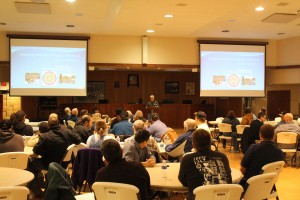
– IBEW Local 1 photo
By JOHN MOYLE
IBEW Local 1
IBEW Local One is taking a lead role in the fight against right-to-work (RTW) in Missouri by educating fellow union members on the anti-union, anti-worker legislation and asking them to educate others on the damage RTW would do to Missouri.
The Missouri Legislature is currently considering several bills that would make right-to-work a reality in Missouri. House Speaker Tim Jones (R-Eureka) has made passing anti-worker union-busting right-to-work a priority in this session.
Local 1 is holding weekly meetings to educate its members on the lies of RTW, a partisan political ploy that undermines the basic rights of workers. By making unions weaker, RTW laws lower wages and living standards for all workers in the state.
Former State Senator Tim Green, director of political and legislative affairs for Local 1 and the St. Louis Electrical Connection, has been making presentations throughout the St. Louis area, and across the state – including the North County Labor Club on Jan. 13 and IBEW Local 124 in Kansas City on Jan. 21 – to help prepare union members for their part in the fight that is already under way at the State Capital.
Green, who retired as the Democratic senator from Spanish Lake in 2012 due to term limits, was instrumental in stopping right-to-work laws and other anti-worker legislation during his time in the Legislature.
NO NEW RIGHTS
Proponents of RTW say it gives workers a “choice” by prohibiting the collection of union fees from all employees by an employer. What they don’t say is that federal law already allows workers to opt out of paying union dues, requiring only that they pay a fee for collective bargaining done by the union that benefits them.
“It is already the law that no one in Missouri can be forced to be a member of a union or contribute a single cent to politicians or political causes he or she opposes,” Green said.
RTW is nothing more than an effort to reduce the power of workers in the workplace while also taking away the right of Missouri companies to organize their shops as they feel best suits their business needs.
DOESN’T CREATE JOBS
RTW has nothing to do with guaranteeing anyone a job, Green said. In fact, it’s likely to cost good jobs.
Consider Tennessee, the state Lt. Governor Kinder used as an example of Missouri’s future under RTW in a CBS interview in December.
Tennessee has an 8.1 percent unemployment rate, which is 33 percent higher than Missouri’s 6.1 percent according to the Nov 2013 Local Area Unemployment Statistics from the Bureau of Labor Statistics.
Even where there is job growth in RTW states, that growth is mostly in low wage areas.
Data from The Corporation for Enterprise Development’s 2010 Assets and Opportunities Scorecard shows that 26.7 percent of jobs are in low-wage occupations in states with RTW laws, compared with only 19.5 percent in other states.
Missouri Rep. Eric Burlison (R-Springfield) seems to agree with this assessment.
In a Missouri Times interview on the same day as the first hearing on his deceptively named “Freedom to Work” Act (RTW by another name), Burlison said “If a company hires new employees under right-to-work, they are probably bringing someone in at an entry level, and those people aren’t going to be paid what the long-time union workers are making.”
He said this despite his inability to speak to the effect RTW would have on wages in Missouri just hours before at the hearing.
LOWERS WAGES
State Senator Ed Emergy (R-Lamar), an American Legislative Exchange Council (ALEC) co-chair and proponent of RTW– admits that the bogus law is about lowering wages in Missouri.
At a press conference on Jan. 7, Emery said:
“One of the things that will be advocated by the unions is look at all these right to work states, average wages all go down. Sure they go down!”
This isn’t a new concern. In 2001, Lawrence Mishel detailed the problem in a study for the Economic Policy Institute where he concluded:
“We find that the mean effect of working in a right-to-work state results in a 6 percent to 8 percent reduction in wages for workers in these states, with an average wage penalty of 6.5 percent”.
In 2012 Elise Gould’s and Heidi Shierholz’s research for EPI showed the average worker in RTW states earns an average of $1,500 less a year than those in non-RTW states.
WORKING FAMILIES NEED TO SPEAK UP
With jobs and wages on the line at a time when so many working families are struggling in Missouri and elsewhere, Local 1 is asking working people to educate themselves as well as write their state representatives and senators about how RTW will hurt them.
Writing letters-to-the-editor of your local newspaper and educating family, friends and neighbors is critical.
BUSINESSES NEED TO BE HEARD, TOO
Union contractors have a role to play as well, Local 1 says.
As Keith Querry, a 55- year IBEW Local 124 member and former board member of Blue Cross/Blue Shield said at a recent presentation in Kansas City, “We need employers and business leaders to write in about the negative impact this RTW will have on their businesses and customers.”
Living wage jobs, like those the United Auto Workers, General Motors and Ford brought to the state along with nearly $2 billion in investments in their Missouri plants, economic development, infrastructure, education and energy investments all will have far more impact on existing Missouri businesses, and a much greater chance to create real jobs and attract new businesses to Missouri, than RTW.

